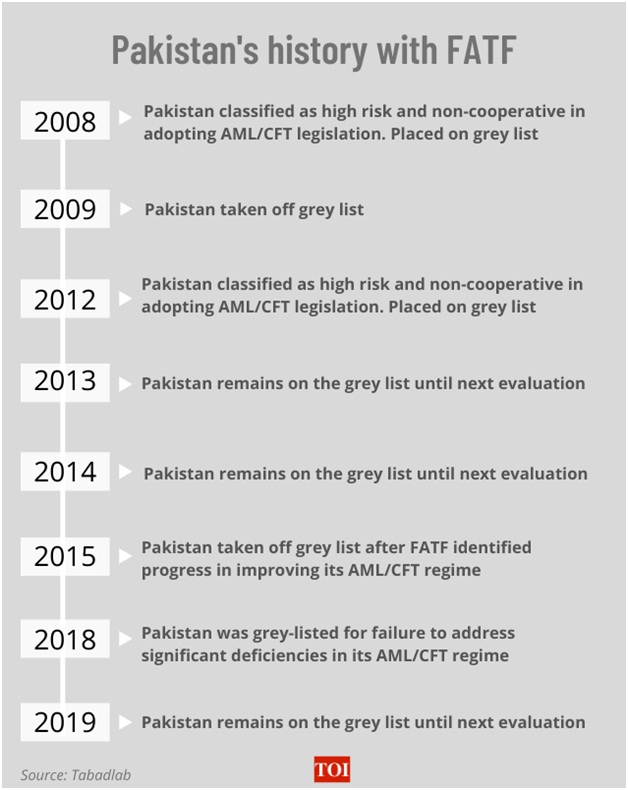Context:
- Financial Action Task Force has decided once again to keep Pakistan on its ‘grey list’ of countries under ‘increased monitoring’, giving it another three months to complete its commitments.
- After being removed from that list in 2015, Pakistan was put back on it in June 2018, and handed a 27-point action list to fulfill.
About FATF:
- The Financial Action Task Force (FATF) is an inter-governmental decision-making body.
- It was established in 1989 during the G7 Summit in Paris to develop policies against money laundering.
- It is a “policy-making body” which works to generate the political will to bring about national legislative and regulatory reforms in money laundering.
- It has also started dealing with virtual currencies. The FATF Secretariat is located in Paris.
What is the objective of FATF?
- FATF sets standards and promotes effective implementation of:
- legal, regulatory and operational measures for combating money laundering.
- The FATF works to identify national-level vulnerabilities with the aim of protecting the international financial system from misuse.
How many members are there in FATF?
- The FATF currently comprises 37 member jurisdictions and 2 regional organisations,the European Commission and the Gulf Cooperation Council, making its effective membership to 39.
Is India a member of the Financial Action Task Force?
- India became an Observer at FATF in 2006. Since then, it had been working towards full-fledged membership.
- On June 25, 2010 India was taken in as the 34th country member of FATF.
FATF on terror financing
- FATF's role in combating terror financing became prominent after the 9/11 terror attacks in the US.
- In 2001 its mandate expanded to include terrorism financing.
- Financing of terrorism involves providing money or financial support to terrorists.
What as FATF 'grey list' and 'blacklist'?
FATF has 2 types of lists:
- Black List:Countries known as Non-Cooperative Countries or Territories (NCCTs) are put in the blacklist.
- These countries support terror funding and money laundering activities.
- The FATF revises the blacklist regularly, adding or deleting entries.
- Grey List: Jurisdictions under increased monitoring( GREY LIST) are actively working with the FATF to address strategic deficiencies in their regimes to counter money laundering, terrorist financing, and proliferation financing.
- When the FATF places a jurisdiction under increased monitoring, it means the country has committed to resolve swiftly the identified strategic deficiencies within agreed timeframes and is subject to increased monitoring.
- This list is often externally referred to as the ‘grey list’.
- This inclusion serves as a warning to the country that it may enter the blacklist.
Consequences of being in the FATF grey list:
- Considered in the grey list may face
- Economic sanctions from IMF, World Bank, ADB
- Problem in getting loans from IMF, World Bank, ADB and other countries
- Reduction in international trade
- International boycott
FATF &Pakistan:
- FATF President Marcus Pleyer announced that although Pakistan has made “significant progress”, it had three remaining points of the 27 that were only partially addressed, notably all in the area of curbing terror financing.
- The body listed the remaining tasks: demonstrating terror-funding prosecution is accurate, effective and dissuasive, and thoroughly implementing financial sanctions against all terrorists designated by the UN Security Council, which include LeT founder Hafiz Saeed, JeM chief MasoodAzhar, other leaders of terror groups in Pakistan, and those belonging to al Qaeda.
- Pakistan has lost $38 billion because of its time on the grey list (2008-2015 and 2018-the present).
- Pakistan's inclusion in the grey list can be attributed to the fact that the country's anti-terror laws are still not in line with FATF standards and also with the latest UN resolution 2462 that pitches for criminalising terrorist financing.
- What Pakistan has mostly done in the past is detain both MasoodAzhar and Hafiz Saeed for 'apprehension' of breach of peace.
- While there were some arrests of LeT, JeM, JuD cadres, they were all apprehended under the country's Maintenance of Public Order Act and not the Anti-Terrorism Act, 1997.

Recent development in India - Pakistan relations:
- The FATF decision coincides with the first signs of a thaw between India and Pakistan since 2016.
- The decision of the Directors General of Military Operations, to strictly observe the ceasefire agreement at the LoC, and media news that National Security Adviser AjitDoval has been in touch with senior officials including the Pakistan Army Chief, are both significant.
- The joint statement also commits to resolving “core issues” that lead to violence between the two sides, indicating more dialogue between India and Pakistan could be on the cards, as there is no political, trade, cultural ties at present.

CONCLUSION:
- Pakistan’s next steps on the FATF directive to successfully prosecute terrorists and terror financers identified by the grouping are in its own interests.
- Thus New Delhi-Islamabad engagement in the next few months would get a much-needed boost if Pakistan traverses this ‘last mile’ on the FATF grey list, addressing India’s main grievance on cross-border terror that emanates from its soil.

 Contact Us
Contact Us  New Batch : 9555124124/ 7428085757
New Batch : 9555124124/ 7428085757  Tech Support : 9555124124/ 7428085757
Tech Support : 9555124124/ 7428085757








